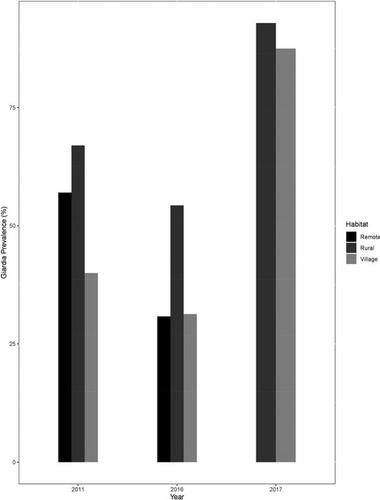当前位置:
X-MOL 学术
›
Ecol. Evol.
›
论文详情
Our official English website, www.x-mol.net, welcomes your
feedback! (Note: you will need to create a separate account there.)
Effects of anthropogenic habitat disturbance and Giardia duodenalis infection on a sentinel species' gut bacteria
Ecology and Evolution ( IF 2.3 ) Pub Date : 2020-12-12 , DOI: 10.1002/ece3.6910 Sahana Kuthyar 1, 2 , Martin M Kowalewski 2, 3 , Dawn M Roellig 4 , Elizabeth K Mallott 1 , Yan Zeng 1 , Thomas R Gillespie 2 , Katherine R Amato 1
Ecology and Evolution ( IF 2.3 ) Pub Date : 2020-12-12 , DOI: 10.1002/ece3.6910 Sahana Kuthyar 1, 2 , Martin M Kowalewski 2, 3 , Dawn M Roellig 4 , Elizabeth K Mallott 1 , Yan Zeng 1 , Thomas R Gillespie 2 , Katherine R Amato 1
Affiliation

|
Habitat disturbance, a common consequence of anthropogenic land use practices, creates human–animal interfaces where humans, wildlife, and domestic species can interact. These altered habitats can influence host–microbe dynamics, leading to potential downstream effects on host physiology and health. Here, we explored the effect of ecological overlap with humans and domestic species and infection with the protozoan parasite Giardia duodenalis on the bacteria of black and gold howler monkeys (Alouatta caraya), a key sentinel species, in northeastern Argentina. Fecal samples were screened for Giardia duodenalis infection using a nested PCR reaction, and the gut bacterial community was characterized using 16S rRNA gene amplicon sequencing. Habitat type was correlated with variation in A. caraya gut bacterial community composition but did not affect gut bacterial diversity. Giardia presence did not have a universal effect on A. caraya gut bacteria across habitats, perhaps due to the high infection prevalence across all habitats. However, some bacterial taxa were found to vary with Giardia infection. While A. caraya's behavioral plasticity and dietary flexibility allow them to exploit a range of habitat conditions, habitats are generally becoming more anthropogenically disturbed and, thus, less hospitable. Alterations in gut bacterial community dynamics are one possible indicator of negative health outcomes for A. caraya in these environments, since changes in host–microbe relationships due to stressors from habitat disturbance may lead to negative repercussions for host health. These dynamics are likely relevant for understanding organism responses to environmental change in other mammals.
中文翻译:

人为栖息地干扰和十二指肠贾第鞭毛虫感染对哨兵物种肠道细菌的影响
栖息地干扰是人为土地利用行为的常见后果,它创造了人与动物的界面,使人类、野生动物和家养物种可以相互作用。这些改变的栖息地可以影响宿主-微生物动态,从而对宿主生理和健康产生潜在的下游影响。在这里,我们探讨了与人类和家养物种的生态重叠以及原生动物寄生虫十二指肠贾第鞭毛虫感染对阿根廷东北部关键哨兵物种黑吼猴和金吼猴( Alouatta caraya )细菌的影响。使用巢式 PCR 反应对粪便样本进行十二指肠贾第鞭毛虫感染筛查,并使用 16S rRNA 基因扩增子测序对肠道细菌群落进行表征。栖息地类型与香樟肠道细菌群落组成的变化相关,但不影响肠道细菌多样性。贾第鞭毛虫的存在并没有对不同栖息地的香柠檬肠道细菌产生普遍影响,这可能是因为所有栖息地的感染率都很高。然而,一些细菌分类群被发现随贾第鞭毛虫感染而变化。虽然香柠檬的行为可塑性和饮食灵活性使它们能够利用一系列栖息地条件,但栖息地通常受到更多的人为干扰,因此不太适宜居住。肠道细菌群落动态的变化是这些环境中香槠负面健康结果的可能指标之一,因为栖息地干扰造成的压力源导致宿主与微生物关系的变化可能会对宿主健康产生负面影响。 这些动态可能与理解其他哺乳动物的生物体对环境变化的反应有关。
更新日期:2021-01-08
中文翻译:

人为栖息地干扰和十二指肠贾第鞭毛虫感染对哨兵物种肠道细菌的影响
栖息地干扰是人为土地利用行为的常见后果,它创造了人与动物的界面,使人类、野生动物和家养物种可以相互作用。这些改变的栖息地可以影响宿主-微生物动态,从而对宿主生理和健康产生潜在的下游影响。在这里,我们探讨了与人类和家养物种的生态重叠以及原生动物寄生虫十二指肠贾第鞭毛虫感染对阿根廷东北部关键哨兵物种黑吼猴和金吼猴( Alouatta caraya )细菌的影响。使用巢式 PCR 反应对粪便样本进行十二指肠贾第鞭毛虫感染筛查,并使用 16S rRNA 基因扩增子测序对肠道细菌群落进行表征。栖息地类型与香樟肠道细菌群落组成的变化相关,但不影响肠道细菌多样性。贾第鞭毛虫的存在并没有对不同栖息地的香柠檬肠道细菌产生普遍影响,这可能是因为所有栖息地的感染率都很高。然而,一些细菌分类群被发现随贾第鞭毛虫感染而变化。虽然香柠檬的行为可塑性和饮食灵活性使它们能够利用一系列栖息地条件,但栖息地通常受到更多的人为干扰,因此不太适宜居住。肠道细菌群落动态的变化是这些环境中香槠负面健康结果的可能指标之一,因为栖息地干扰造成的压力源导致宿主与微生物关系的变化可能会对宿主健康产生负面影响。 这些动态可能与理解其他哺乳动物的生物体对环境变化的反应有关。











































 京公网安备 11010802027423号
京公网安备 11010802027423号